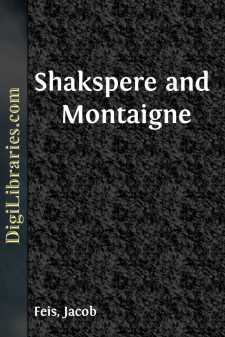Categories
- Antiques & Collectibles 13
- Architecture 36
- Art 48
- Bibles 22
- Biography & Autobiography 813
- Body, Mind & Spirit 142
- Business & Economics 28
- Children's Books 17
- Children's Fiction 14
- Computers 4
- Cooking 94
- Crafts & Hobbies 4
- Drama 346
- Education 46
- Family & Relationships 57
- Fiction 11829
- Games 19
- Gardening 17
- Health & Fitness 34
- History 1377
- House & Home 1
- Humor 147
- Juvenile Fiction 1873
- Juvenile Nonfiction 202
- Language Arts & Disciplines 88
- Law 16
- Literary Collections 686
- Literary Criticism 179
- Mathematics 13
- Medical 41
- Music 40
- Nature 179
- Non-Classifiable 1768
- Performing Arts 7
- Periodicals 1453
- Philosophy 64
- Photography 2
- Poetry 896
- Political Science 203
- Psychology 42
- Reference 154
- Religion 513
- Science 126
- Self-Help 84
- Social Science 81
- Sports & Recreation 34
- Study Aids 3
- Technology & Engineering 59
- Transportation 23
- Travel 463
- True Crime 29
Shakspere and Montaigne
by: Jacob Feis
Description:
Excerpt
INTRODUCTION.
It has always been a daring venture to attempt finding out Shakspere's individuality, and the range of his philosophical and political ideas, from his poetical productions. We come nearest to his feelings in his 'Sonnets;' but only a few heavy sighs, as it were, from a time of languish in his life can be heard therefrom. All the rest of those lyrical effusions, in spite of the zealous exertions of commentators full of delicate sentiment and of deep thought, remain an unsolved secret.
In his historical dramas, a political creed has been pointed out, which, with some degree of certainty, may be held to have been his. From his other dramas, the most varied evidence has been drawn. A perfect maze of contradictions has been read out of them; so much so that, on this ground, we might almost despair of trustworthy results from further inquiry.
The wildest and most incongruous theories have been founded upon 'Hamlet' —the drama richest in philosophical contents. Over and over again men have hoped to be able to ascertain, from this tragedy, the great master's ideas about religion. It is well-nigh impossible to say how often such attempts have been made, but the reward of the exertions has always remained unsatisfactory. On the feelings which this masterwork of dramatic art still excites to-day—nearly three hundred years after its conception—thousands have based the most different conclusions; every one being convinced of the correctness of his own impressions. There is a special literature, composed of such rendering of personal impressions which that most enigmatical of all dramas has made upon men of various disposition. Every hypothesis finds its adherents among a small group, whilst those who feel differently smile at the infatuation of their antagonists. Nothing that could give true and final satisfaction has yet been reached in this direction.
It is our intention to regard 'Hamlet' from a new point of view, which seems to promise more success than the critical endeavours hitherto made. We propose to enter upon a close investigation of a series of circumstances, events, and personal relations of the poet, as well as of certain indications contained in other dramatic works—all of the period in which 'Hamlet' was written and brought into publicity. This valuable material, properly arranged and put in its true connection, will, we believe, furnish us with such firm and solid stepping-stones as to allow us, on a perfectly trustworthy path, to approach the real intentions of this philosophical tragedy. It has long ago been felt that, in it, Shakspere has laid down his religious views. By the means alluded to we will now explain that credo.
We believe we can successfully show that the tendency of 'Hamlet' is of a controversial nature. In closely examining the innovations by which the augmented second quarto edition [1](1604) distinguishes itself from the first quarto, published the year before (1603), we find that almost every one of these innovations is directed against the principles of a new philosophical work—The Essays of Michel Montaigne—which had appeared at that time in England, and which was brought out under the high auspices of the foremost noblemen and protectors of literature in this country....


